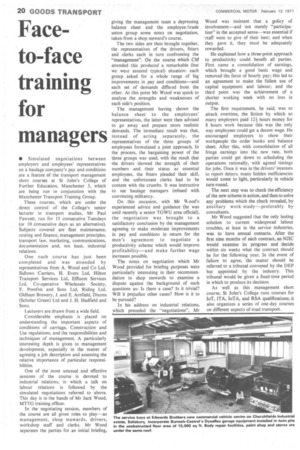Face
Page 22

If you've noticed an error in this article please click here to report it so we can fix it.
to-face training for managers
• Simulated negotiations between employers and employees' representatives on a haulage company's pay and conditions are a feature of the transport management short courses at St John's College of Further Education, Manchester 3, which are being run in conjunction with the Manchester Transport Training Group.
These courses, which are under the direct control of the College's senior lecturer in transport studies, Mr Paul Fawcett, run for 15 consecutive Tuesdays (or 10 consecutive days as an alternative). Subjects covered are fleet maintenance, costing and finance, management principles, transport law, marketing, communications, documentation and, not least, industrial relations.
One such course has just been completed and was attended by representatives from A. Wood and Co Ltd, Sidlows Carriers, H. Evers Ltd, Hilton Transport Services Ltd, Effluent Services Ltd, Co-operative Wholesale Society, F. Pomfret and Sons Ltd, Riding Ltd, Oldham Brewery, J. and E. Arnfield, Dixons (Scholar Green) Ltd and J. H. Hadfield and Sons.
Lecturers are drawn from a wide field.
Considerable emphasis is placed on understanding the important aspects of conditions of carriage, Construction and Use regulations, and the responsibilities and techniques of management. A particularly interesting depth is given to management development, especially in the matter of agreeing a job description and assessing the relative importance of particular responsibilities.
One of the most unusual and effective sessions of the course is devoted to industrial relations, in which a talk on labour relations is followed by the simulated negotiations referred to above. This day is in the hands of Mr Jack Wood, MTTG training officer.
In the negotiating session, members of the course are all given roles to play—as management, shop stewards, drivers, wOrkshop staff and clerks. Mr Wood separates the parties for an initial briefing, giving the management team a depressing balance sheet and the employee/trade union group some notes on negotiation, taken from a shop steward's course.
The two sides are then brought together, the representatives of the drivers, fitters and clerks each in turn confronting the "management". On the course which CM attended this produced a remarkable (but we wei e assured typical) situation: each group asked for a whole range of big improvements in pay and conditions—and each set of demands diffeied from the other. At this point Mr Wood was quick to analyse the strengths and weaknesses of each side's position.
The management having shown the balance sheet to the employees' representatives, the latter were then advised to go away and prepare more realistic demands. The immediate result was that, instead of acting separately, the representatives of the three groups of employees formulated a joint approach. In the process, the bargaining power of the three groups was used, with the result that the drivers showed the strength of their numbers and their status as essential employees, the fitters pleaded their skill, and the unfortunate clerks had to be content with the crumbs. It was instructive to see haulage managers imbued with convincing militancy.
On this occasion, with Mr Nx, ood's experienced advice and guidance (he was until recently a senior TGWU area official), the negotiation was brought to a satisfactory conclusion by the management agreeing to make moderate improvements in pay and conditions in return for the men's agreement to negotiate a productivity scheme which would improve profitability—and make further wage increases possible.
The notes on negotiation which Mr Wood provided for briefing purposes were particularly interesting in their recommendation to shop stewards to examine a dispute against the background of such questions as: Is there a case? Is it trivial? Will it prejudice other cases? How is it to be pursued?
In his address on industrial relations, which preceded the "negotiations", Mr Wood was insistent that a policy of involvement—and not merely "participa tion" in the accepted sense—was essential if 'staff were to give of their best; and when they gave it, they must be adequately rewarded.
He explained how, a three-point approach to productivity could benefit all parties.
First came a consolidation of earnings, which brought a good basic wage and removed the farce of hourly pay; this led to an agreement to make the fullest use of capital equipment and labour; and the third point was the achievement of a shorter working week with no loss in output.
The first requirement, he said, was to attack overtime, the fiction by which so many employers paid 12t hours money for 8 hours work because this was the only way employees could get a decent wage. He encouraged employers to show their workpeople the order books and balance sheet. After this, with consolidation of all fringe earnings into the new rate, both parties could get down to scheduling the operations rationally, with agreed timings for jobs. Once it was in the drivers' interests to report delays, many hidden inefficiencies would come to light, particularly in vehicle turn-round.
The next step was to check the efficiency of the new scheme in action, and then to solve any problems which the check revealed, by ancillary work-study--preferably by consultants.
Mr Wood suggested that the only lasting solution to current widespread labour troubles, at least in the service industries, was to have annual contacts. After the first nine months of each contract, an NJIC would examine its progress and decide within six weeks what the contract should be for the following year. In the event of failure to agree, the matter should be referred to a tribunal convened by the DEP but appointed by the industry. This tribunal would be given a fixed-time period in which to produce its decision.
As well as this management short course, St John's College runs courses for IoT, ITA, IoTA, and RSA qualifications; it also organizes a series of one-day courses on different aspects of road transport.
































































































